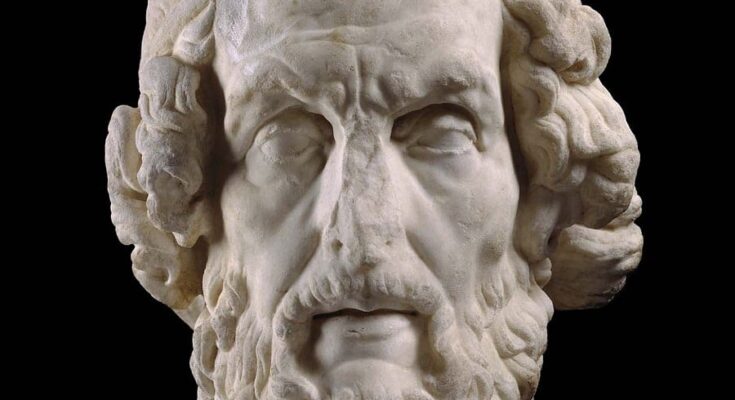
Homer was one of the most important figures in ancient Greece. His contribution to ancient Greek culture was immense, due to his two most famous poems – the Iliad and the Odyssey. To the ancient Greeks, the works of Homer were as important as the Bible is today. It’s ironic, then, that many scholars actually question whether or not Homer was real. What does the evidence show?
Reasons for doubting Homer’s existence
The main reason some scholars doubt that Homer ever existed is because of a lack of contemporary evidence. Most scholars believe that Homer was supposed to have lived in the eighth or even ninth century BC, whereas the first reference to Homer appears to be from the late seventh century BC. This would be between one and two centuries after his supposed lifetime. This gap is viewed as too large for scholars to be confident that he really existed.
One historian has made a different kind of argument. Adam Nicolson argues that the Iliad and the Odyssey show signs of originating from about 1000 years earlier than when Homer is supposed to have lived. This would mean that Homer cannot have been their author. Since Homer’s only contribution to history is as the supposed author of those poems, that would take away his historical standing.
Another argument is that there is supposedly evidence that the Iliad and the Odyssey did not have the same author. This would mean that ‘Homer’ was just a fiction created to neatly explain the existence of both poems.
The issue of when Homer really lived
A key issue involved in this debate is the matter of when Homer really lived. Herodotus claimed that Homer lived ‘no more than 400 years’ before his own time. That would place Homer in the ninth century BC.
But notice that he said ‘no more’ than that length of time. This means that this was the upper limit. Some scholars think that Herodotus had information that Homer lived 10 generations before his own time, and that he was using an upper limit of 40 years per generation in his calculation. A more realistic estimate would be 25 years per generation, which would place Homer in c. 700 BC.
Some other ancient historians explicitly placed Homer in this era, or even a little later. Strabo referred to certain ancient chroniclers who placed Homer at or just after the time of the Cimmerian invasions of Anatolia. That would place Homer in the seventh century BC. The fourth century BC writer Theopompus and the third century BC writer Euporion also supported that date.
This would mean that the earliest reference to Homer, from the late seventh century BC, is actually a near-contemporary reference. This would mean that we can reasonably trust its reliability.
The issue of when the Iliad and the Odyssey were written
Homer could not have been the person who wrote the Iliad and the Odyssey if those poems actually came from over 1000 years before Homer supposedly lived. But the case made by historians such as Adam Nicolson is very weak. They point out that these poems contain certain similarities to stories found all over Europe, indicating that they originate from thousands of years ago.
But this objection is easily explained. Homer could have been using motifs and tropes that were familiar to him. These motifs could have originated thousands of years before Homer’s supposed lifetime, but that does not mean that the poems themselves did.
The fact is that there is still a lot of debate over whether or not the Iliad and the Odyssey were composed by a single author. It is not a closed case by any means. Different scholars have different opinions. The key reason why some scholars think that they may have been composed by different people is because of discrepancies between the two poems.
There are differences in the way that the poems present certain matters. For example, the Iliad seems to present a positive view of the Phoenicians, while the Odyssey seems to present a negative view of them. The former also presents Achilles’ attitude about death in a very different way to how the latter poem presents it.
However, these are not irreconcilable differences. Apparent differences in viewpoint can be easily explained as being due to different contexts. In the Iliad, Homer was focusing on the glory of the Phoenician items that were being used by certain characters. Obviously, it would make sense for Homer to glorify the things being used by his heroes. But in the Odyssey, which is a story about voyaging, the rivalry between the Greeks and the Phoenicians at sea would obviously be more relevant.
Importantly, both poems display the same style of language. Also, scholars have shown that the language of both poems comes from the same era. These two facts support the idea that they could have had the same author. In any case, it is a question that scholars still debate.
Conclusion
In conclusion, scholars still do not agree about whether or not Homer was real. However, most of the arguments against Homer being real are not particularly strong. For example, it is claimed that there is no near-contemporary reference to him, but the evidence actually indicates that his supposed lifetime should be placed in the seventh century BC, not the eighth or the ninth.
This would mean that the earliest reference to him comes from just a few decades after he supposedly lived, making it a reliable source by any reasonable standard. The other arguments against Homer being real are also fairly weak. Nonetheless, the issue of whether or not Homer was real is still far from settled.



